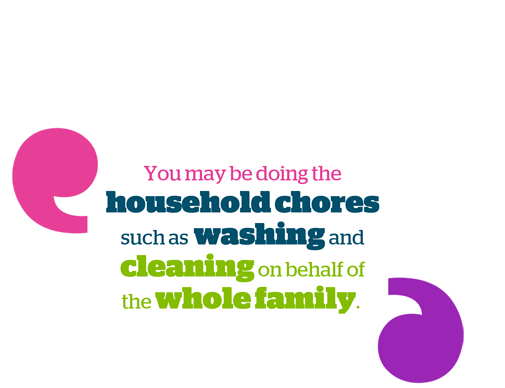If you are under 18 and look after a parent or relative who is ill, has a long-term illness, has a physical or mental disability or is addicted to drugs or alcohol, then you could be a young carer.
"You may be doing the household chores such as washing, cooking, and cleaning on behalf of the whole family."
You may be providing personal or nursing care like giving medication, changing dressings, helping with mobility, or intimate care such as washing, dressing, assisting with toilet requirements, or giving emotional support. This can feel stressful or overwhelming at times. Sometimes you may feel under pressure to take time off school or college to help around the house, or may not have time to go out with your friends, do homework, or play.
Many young carers find it difficult to talk about being a carer. You may worry that people will think you aren't coping, or that your family will be split up if you don't carry on with your caring role. But it's important to understand there are organisations who can help and support you, so you can balance your responsibilities with your personal life, and not miss out on things.
It can be hard to think about your future, whether you plan to get a job or apprenticeship, go to college or university. But you have to live your life too. That doesn’t mean that you love your family any less. It’s good to talk about how you feel and ask for help if you need it.
"Caring for someone can make you feel tired so try to look after yourself, both physically and mentally."
It’s okay to have some time doing things you enjoy, like relaxing with friends or listening to music. The person you are caring for wants you to enjoy life too.






